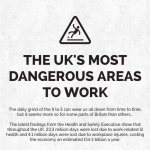 The most dangerous places to work in the UK, according recent data from the UK Health and Safety Executive (HSE), are the East Midlands, Wales and Yorkshire and Humber.
The most dangerous places to work in the UK, according recent data from the UK Health and Safety Executive (HSE), are the East Midlands, Wales and Yorkshire and Humber.
The HSE’s findings have been put together into a clickable interactive map by Vero Solutions: http://vero.solutions/uks-dangerous-areas-work
The East Midlands has the highest amount of ill health incidences in the workplace, although most are non-fatal, while Scotland tops the table for workplace injuries resulting in death. Meanwhile, the North West has the most cases prosecuted when it comes to injuries.
The most dangerous sectors to work in (according to recorded incidents) are: manufacturing; agriculture; forestry and fishing; construction; food service; and transport and forage. Along with the HSE’s discovery that 4.1 million days were lost due to workplace injuries, it was revealed that health and safety incidents are costing the economy an estimated £14.3 billion a year.
While the most at-risk sectors are very different when it comes to the top sectors for growth in 2016 (predicted to be healthcare, accounting and finance, construction, engineering and IT and digital), Vero Solutions believes that recruiters should be aware that if they are based in one of the ‘danger regions’, they may struggle to persuade candidates to relocate to these areas – or if they are recruiting for one of the specific ‘danger sectors’, they may struggle to attract candidates.
To help recruiters to avoid this problem, Tim Young, Managing Director of Vero Solutions, commented on the importance of businesses ensuring that they are upholding industry relevant health and safety policies to attract the best possible candidates.
He said: “It’s important that you understand your specialist sector well and can speak about the positives and challenges of working in the given industry. For example, the construction industry is one of the most hazardous and accident-prone working environments, so it’s important that you are aware people will have a natural concern about working within the sector. It’s a recruiter’s role to address these concerns and encourage the candidate to focus on the positives.
“Potential candidates could be resistant to relocating to these regions as the data might imply that companies may not have thorough health and safety policies in place, which would help reduce injuries. To overcome this, it’s important recruiters encourage businesses to check their policies and ensure that they are compliant with industry regulations. This will help to reassure candidates that their new prospective workplace is safe, secure and responsible.”

 Subscribe to RSS
Subscribe to RSS

 Print
Print Email
Email
















